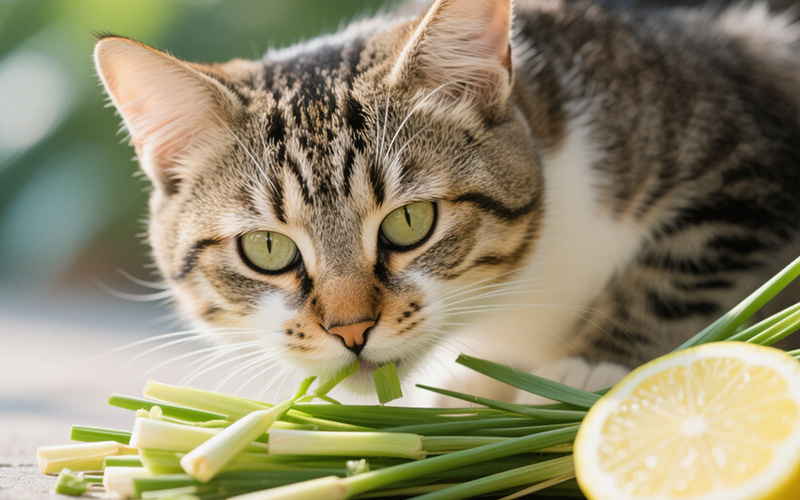Can Cats Eat Lemongrass? Is This Herb Safe for Your Feline Friend?
- 7 Apr 2025 16:56
Lemongrass is a fragrant herb commonly used in cooking and herbal teas, known for its refreshing lemon-like flavor and scent. But when it comes to cats, can cats eat lemongrass? While lemongrass is not toxic to cats, it’s important to understand how it might affect them and whether it’s a good choice for a snack.

Is Lemongrass Safe for Cats?
In small amounts, lemongrass is generally safe for cats. It's not toxic like some other plants (such as lilies or tulips), and it doesn’t pose a significant danger if your cat happens to nibble on it. However, lemongrass does have certain properties that could potentially cause issues if consumed in large quantities or if your cat has a sensitive stomach.
Potential Risks of Lemongrass for Cats
Digestive Upset: While lemongrass itself is not toxic, its fibrous nature can cause some digestive upset in cats, especially if they eat a large amount. Excessive consumption of lemongrass can lead to symptoms like vomiting, diarrhea, or stomach discomfort.
Choking Hazard: Lemongrass leaves are long and tough, which could pose a choking hazard if your cat attempts to swallow them whole without chewing. Cats are more likely to nibble on the tender ends of the leaves, but there is still a risk, especially if they try to eat a larger portion.
Essential Oils: Lemongrass contains essential oils that, while not as harmful as those in some other plants, can still be irritating to your cat's digestive system or skin. Cats are especially sensitive to essential oils, and large amounts of lemongrass oil (from concentrated sources or oils) should never be ingested or applied to their skin.
Benefits of Lemongrass for Cats
Mild Digestive Aid: Some cats may benefit from chewing on small amounts of lemongrass as it can help with mild digestive issues. The fibrous texture might help with the passage of hairballs, promoting easier digestion.
Natural Attraction: Just like catnip, lemongrass can attract some cats because of its smell. The mild scent of lemongrass can be calming for some felines, though it won't have the same stimulating effect as catnip.
Safe Cat Grass Alternative: Lemongrass can sometimes act as a safe alternative to traditional cat grass, which many cats enjoy nibbling on to aid digestion. If you grow lemongrass in your home, you might find that your cat enjoys taking the occasional nibble on it.
What Should You Do If Your Cat Eats Lemongrass?
If your cat has eaten a small amount of lemongrass, there is likely no need for concern, especially if it's not a frequent occurrence. However, if they’ve eaten a large amount or have shown any signs of digestive upset, keep an eye on them for the following symptoms:
Vomiting
Diarrhea
Lethargy
Loss of appetite
If your cat shows any of these symptoms, or if you're unsure how much they have ingested, it's always best to contact your veterinarian for advice.
Safer Alternatives for Cats
If you’re looking for a healthier snack or treat for your cat, consider the following options:
Cat Grass: If your cat loves to nibble on plants, you can provide them with safe cat grass. It’s designed specifically for cats and can help with hairball control and digestion.
Catnip: Many cats enjoy catnip, which can have a stimulating effect. It’s safe for cats and a great way to keep them engaged and entertained.
Cooked Chicken or Turkey: Lean, cooked meats like chicken or turkey are great protein-packed treats that most cats love.
Cat-Specific Treats: Opt for treats made specifically for cats, which are formulated to meet their nutritional needs.
The Role of PettureX in Pet Health
If you're ever unsure about what foods or plants are safe for your cat, PettureX is here to help! PettureX offers 24-hour online consultations, where you can ask questions about your cat’s health and diet. Additionally, its pet image recognition tool can help you determine whether a particular plant or food is safe for your feline friend.
Conclusion
So, can cats eat lemongrass? Yes, lemongrass is generally safe for cats to nibble on in small amounts. However, it's important to ensure they don’t overeat it, as it can cause digestive upset or pose a choking risk. If you want to give your cat a fun, safe plant to munch on, consider offering cat grass or catnip instead.
If you ever have concerns about your cat’s diet or safety, don’t hesitate to reach out to PettureX for expert advice! 🐱💚
Related

Frankly Dangerous: Can Cats Eat Hot Dogs? Vet Explains the Serious Risks
- 16 Apr 2025
A Purrfect Protein? Can Cats Eat Ground Turkey Safely? (Vet-Reviewed Guide)
- 16 Apr 2025
Gritty Situation: Can Cats Eat Grits Safely? Vet Explains the Risks
- 16 Apr 2025
Gravy Danger Zone: Can Cats Eat Gravy Safely? (Vet-Reviewed Warning)
- 16 Apr 2025
Crunchy Query: Can Cats Eat Green Peppers? A Vet-Reviewed Safety Analysis
- 16 Apr 2025
Toxic Temptation: Can Cats Eat Grapefruit? Vet Explains the Dangers
- 16 Apr 2025
Emergency Meal or Major Mistake? Can Cats Eat Dog Food For A Couple Days? (Vet Guide)
- 16 Apr 2025
Dandelions & Felines: Can Cats Eat These Common Weeds Safely? Vet Explains
- 16 Apr 2025
Flaky Danger: Can Cats Eat Croissants Safely? Vet Explains the Buttery Risks
- 16 Apr 2025
Hazard Alert: Can Cats Eat Corn Husks? Vet Explains Dangers of This Fibrous Material
- 16 Apr 2025
